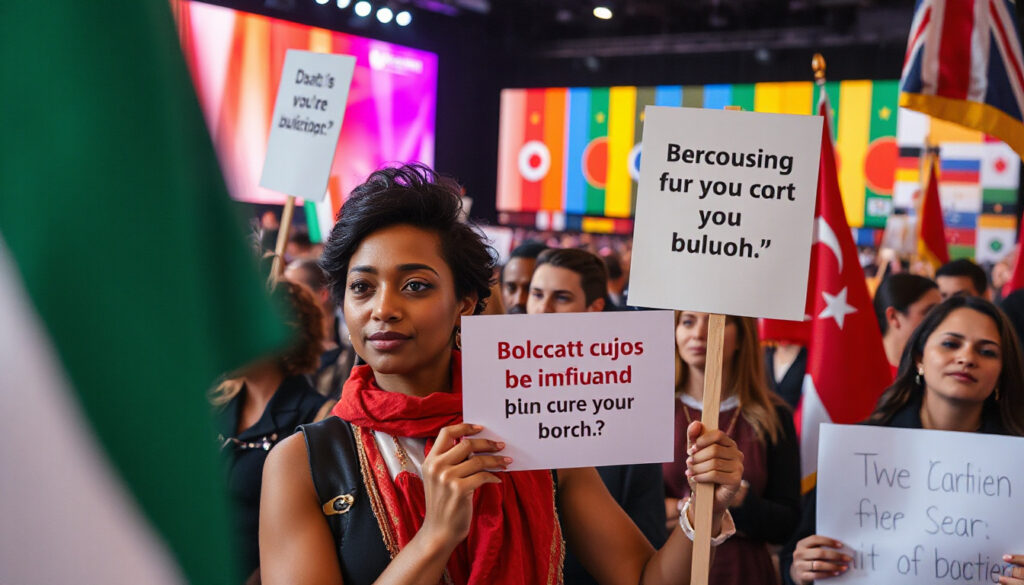The 2026 Eurovision Boycott: Which Countries Are Taking a Stand?
Eurovision Song Contest celebrates music, culture, and unity. The contest now faces strong political winds. Some nations say they will not join if Israel takes part. This fact ties art and global matters close. We list the countries that may drop out, the reasons they give, and what this choice means for the contest’s road ahead.
Why Are Countries Considering a Boycott of Eurovision 2026?
The fight centers on Israel’s role while it acts in Gaza. A UN inquiry called what happens there genocide. Many nations link Israel’s contest spot with a softening of its hard actions. They see a link between joining the contest and giving silent nods to these acts.
The event now backs more than music. It has grown into a stage for national views and global talk. For some broadcasters and state groups, joining sends a sign of agreement. They choose not to join when events hurt lives.
Which Countries Have Announced or Are Considering a Boycott?
By late 2025, a number of nations have chosen a clear path. Others stay undecided:
-
Confirmed Boycotts
- Spain: This nation from the group known as the “Big Five” says it will exit if Israel joins. Spain adds weight to the move by its funds and its spot in the final.
- Ireland: Irish TV points to loss of life in Gaza as a reason to step back.
- Slovenia
- Iceland
- The Netherlands: Even without recognizing Palestine as a state, this country now threatens to quit over the issues.
-
Countries Considering a Boycott
- Belgium
- Finland
Other “Big Five” nations such as Germany, France, Italy, and the United Kingdom have not set their course. Yet some voices—especially among UK lawmakers and cultural voices—ask for a withdrawal.
What Is the Significance of the “Big Five”?
The “Big Five” are Spain, the United Kingdom, Germany, France, and Italy. They help fund the contest. Their spots in the final are set each year. Spain’s step away pulls more focus to the idea. If more of these key nations join, the contest may change its look, its news, and how the crowd votes.
How Has the Organizing Body Responded?
The European Broadcasting Union (EBU) now moves with care. It set a new deadline for its members. This pause, from early October to mid-December 2025, lets them talk and share their views.
The EBU has kept the contest away from clear politics. In the past, it has stopped entries or dropped nations when songs turned too political. Some now recall Russia’s exit after its actions in Ukraine in 2022. But the EBU holds back from clear political sides that might split its members further.

What Makes Israel’s Participation Controversial?
Israel usually joins Eurovision without dispute. It is a member of the EBU and has taken part since 1973. New world events, however, have made its role a matter of debate.
Critics point to Israel’s use of LGBTQIA+ artists. They call the move “pinkwashing” to say that a modern face is shown to mask deeper hurts. This move of using art as a shield stands in sharp conflict with claims about its Gaza actions.
What’s the Impact on Host Country Austria and the Event?
Austria will host Eurovision 2026 in Vienna. It calls on nations to keep in the show and to stick to ideals of peace and unity. Still, boycotts may shift the focus from art to anger.
In the 2024 and 2025 shows, protests and heat on site were common. Organizers now face a hard task. They must keep a party of culture while state issues show up in public.
Australia’s Position and Potential Role
Australia stays a part of Eurovision by its link to the EBU. Fans in Australia care much for the event. In late 2025, Australia named Palestine as a state amid rising conflict. This move adds weight to the talk of pulling out. Some now ask Australia’s SBS to rethink its choice.
While SBS makes its own calls, its choice may stir talks about free speech and the need to see art separate from state views.
What Could a Boycott Mean for Eurovision?
If many nations step back, the contest will feel real effects:
• There will be fewer acts and a smaller contest.
• Money will drop as boycotting broadcasters pull out funds.
• Voting and the race will shift in new ways.
• The contest may lose some of its pure art feel.
This boycott push shows that big art events now link up with state issues. The nations that act now also stir global views that mix art and world matters.
Summary: The Eurovision 2026 Boycott – Key Points to Remember
• At least five countries plan to quit Eurovision 2026 if Israel takes part: Spain, Ireland, Slovenia, Iceland, and the Netherlands.
• Two more, Belgium and Finland, are weighing the option.
• Spain’s move is noted for its “Big Five” role and fund role.
• The stand comes as a protest against events in Gaza that a UN report calls genocide.
• The EBU now lets members give their views until mid-December 2025.
• Organizers must hold on to peace and art even as state issues rise.
• Australia faces pressure after naming Palestine as a state.
• The case shows that art and global events are now tightly linked.
What’s Next?
Broadcasters will decide by mid-December 2025. Soon, we will know which nations will or will not join the contest. Eurovision fans can expect a changed show and more talk on how art meets politics on the world stage.
Take Action
If you follow Eurovision or care for talks about art and world matters, check updates from the EBU and your national broadcaster. Keep close to news on the official Eurovision site and its channels for updates on the 2026 show. Join in talks that keep discussions fair as art meets state views.
Eurovision is more than a music show; it speaks to real issues. The 2026 stance shows how art grows close to global events and brings different voices into one stage.







